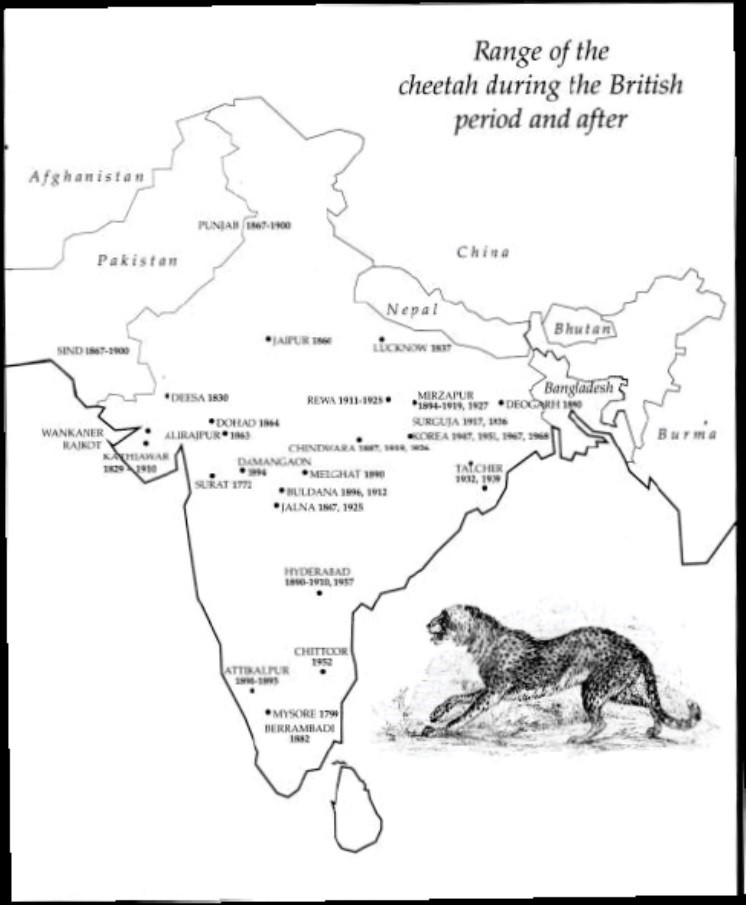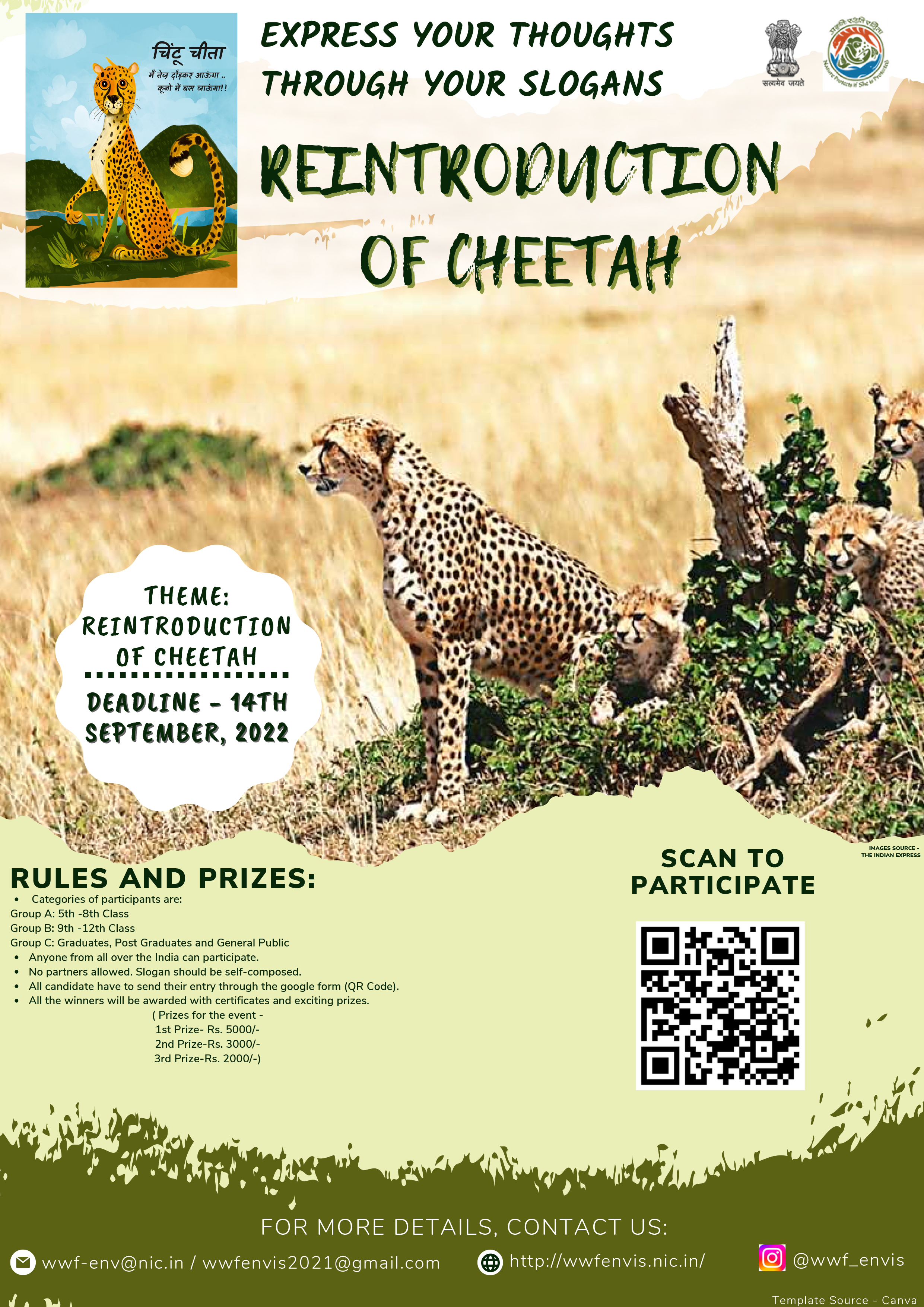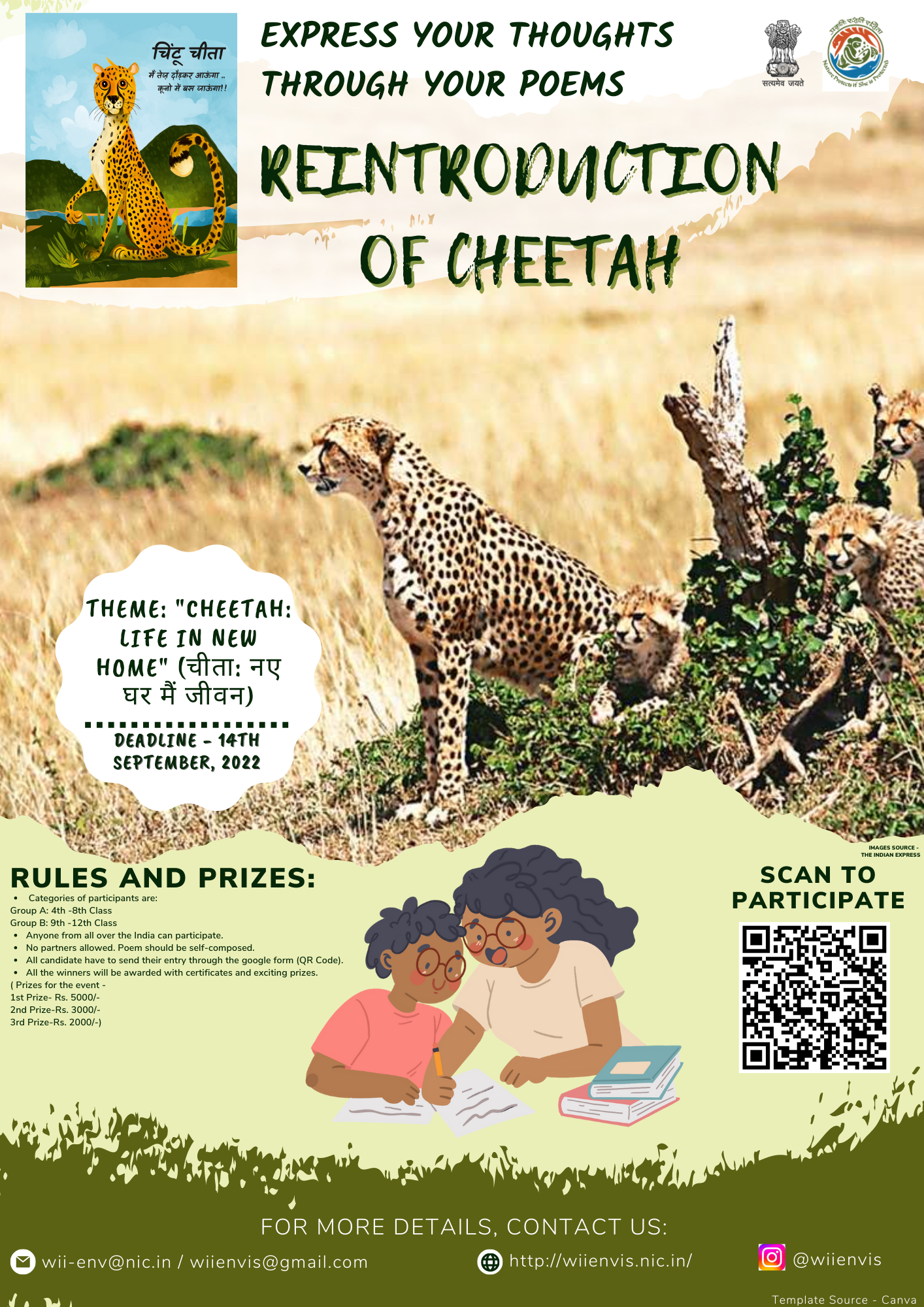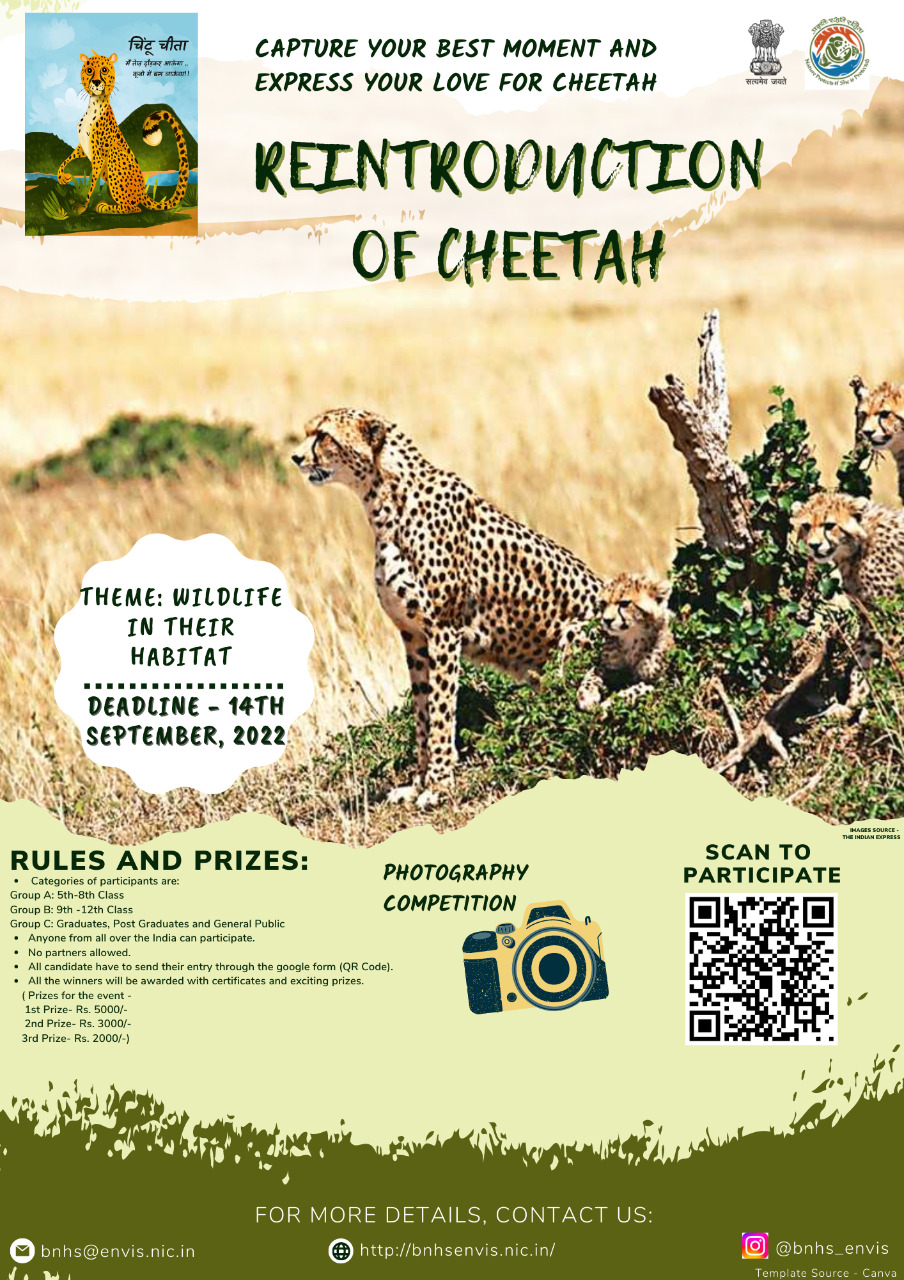Date | 12th September 2022
I. Introduction:
India has the long history of wildlife conservation. One of the most successful wildlife conservation ventures 'Project Tiger' which was initiated way back in 1972, has not only contributed to the conservation of tigers but also of the entire ecosystem. The Project Elepahnt launched in the year of 1992 to protect and conserve the Asian elepahnts in India. Similarly, many successful reintroduction programs have been carried out in India. In continuation of this, the reintroduction of Cheetah which we have lost recently, is a one step ahead and a milestone in the history of wildlife conservation India.
II. Cheetah:
Cheetah are the fastest land mammals, and have been documented as reaching speeds up to 110 km per hour. In the wild Cheetahs live for a maximum of 14 -15 years for females and 10-12 years for males. The gestation period is 90 days and litter size is 2-5 cubs. The Cheetahs weigh approximately 40-60 kg and smaller than common leopard.
III. Distribution:
Historically, Asiatic cheetahs had a very wide distribution in India extending from Gujarat passing through Maharashtra, Madhya Pradesh, Uttar Pradesh, Chhattisgarh, Jharkhand and Odisha in the south till Tamil Nadu.
Approximately 7,000 cheetahs are remaining in 9% of their global range. Cheetahs are found in 17 countries (Algeria; Angola; Benin; Botswana; Burkina Faso; Central African Republic; Chad; Ethiopia; Iran; Kenya; Mali; Mozambique; Namibia; Niger; South Africa; Tanzania; Uganda; Zambia; Zimbabwe)

Range of the Cheetah during the British period and after.
IV. Re Introduction:
In order to revive the past glories and to restore the grassland habitats, the Government of India has decided to introduce the Cheetah, the only large carnivore species that went extinct in Independent India. The Cheetahs for release into the selected sites in India would be sourced from the African continent populations depending on the suitability and continued availability of animals. This international endeavor will not only strengthen the efforts for global conservation of the Cheetah but also the reestablishment of this species in its historical range. The Objectives of the reintroduction Cheetahs are as follows;
- Re-establish the functional role of the Cheetah in representative ecosystems within its historical range. Here the cheetah will serve as a flagship to save not only its prey-base, but also other endangered species of the grassland and semi-arid ecosystems. Resources invested in these highly exploited and neglected systems will ensure better management and restore their ecosystem services for the country.
- Contribute to the global effort towards conservation of the Cheetah as a species.
- Additionally, Cheetah introduction is likely to improve and enhance the livelihood options and economies of the local communities.
The Ministry of Environment Forest and Climate Change (NTCA & WII) in collaboration with Government of Madhya Pradesh has prepared an action plan for introduction of cheetah in India with emphasis on first release site- Kuno National Park involving various stakeholders.
Formal communication from Government of India to the Government of South Africa and Namibia requesting to consider granting permission for export of Cheetahs to India to aid the Government of India in its effort to reintroduce the species to its natural habitat in India has already been done. For the first release site, the Kuno National Park, all preparatory works such as completion of fence, water, and removal of carnivores from inside the cheetah enclosure have been completed. The release of Cheetah is an important step towards wildlife conservation in India and also it is pride moment for every Indian Citizen.
V. Kuno-National Park:
From the 10 potential sites evaluated for the feasibility of establishing cheetah populations in India, the Kuno National Park in the state of Madhya Pradesh was considered as suitable site for Cheetah introduction. Kuno National Park is 748 km2, that is devoid of any human settlements and forms part of the larger Sheopur-Shivpuri dry deciduous open forest landscape spanning an area of 6,800 km2. For housing of introduced Cheetahs, predator proof fenced enclosures over an area of 6 sq km containing seven compartments of 0.7 to 1.1 sq km size, have been created.
The wild ungulates and herbivorous mammals found in the area chital (Axis axis), sambar (Rusa unicolor), nilgai (Boselaphus tragocamelus), wild pig (Sus scrofa), chinkara (Gazella bennettii), chousingha (Tetracerus quadricornis), blackbuck (Antilope cervicapra) now only on the periphery of the NP, northern plains gray langur (Semnopithecus entellus), rhesus macaque (Macaca mulatta), Indian porcupine (Hystrix indica) and black-naped hare (Lepus nigricollis). Mammalian carnivores include leopard (Panthera pardus), sloth bear (Melursus ursinus), striped hyaena (Hyaena hyaena), gray wolf (Canis lupus pallipes), golden jackal (Canis aureus), Indian fox (Vulpes bengalensis), ratel (Mellivora capensis), jungle cat (Felis chaus), Asiatic wild cat (Felis lybica ornata), rusty spotted cat (Prionailurus rubiginosus), Indian gray mongoose (Herpestes edwardsii), ruddy mongoose (Herpestes smithii), Asian palm civet (Paradoxurus hermaphroditus) and small Indian civet (Viverricula indica).

Location of Kuno National Park within the state of Madhya Pradesh, India
A Presentation on Cheetah Reintroduction in India
ALSO READ: Cheetahs are coming back to India; 50 Cheetahs to be reintroduced in National Parks over five years, under 'Action Plan for Introduction of Cheetah in India’
(Source: https://pib.gov.in/)
CONTEST DETAILS
ENVIS Centres along with Ministry of Environment, Forest & Climate Change (MoEF&CC), New Delhi is organizing various competition, like (i) Slogan Contest, (ii) Short Poem Writing Contest and (iii) Photography Contest to celebrate "Reintroduction of Cheetah in India". The details of the events are as mentioned below:

Online Slogan Writing Competition at PAN India Level to celebrate reintroduction of cheetah and awareness about wildlife.
Theme: Reintroduction of Cheetah
Deadline for the submission: 14th September, 2022
Categories of participants
- Group A: 5th -8th Class
- Group B: 9th -12th Class
- Group C: Graduates, Post Graduates and General Public
Rules and Prizes
- Anyone from all over the India can participate.
- No partners allowed. Slogan should be self-composed.
- All the participants have to send their respective entries through the Google Form Link only.
- All the winners will be awarded with certificates and exciting prizes.
- 1st Prize- Rs. 5000/-
- 2nd Prize-Rs. 3000/-
- 3rd Prize-Rs. 2000/-
LINK: https://docs.google.com/forms/

Online Short Poem Contest at PAN India Level to celebrate reintroduction of cheetah and awareness about wildlife.
Theme:Cheetah: Life in new home
Deadline for the submission: 14th September, 2022
Categories of participants
- Group A: 4th -8th Class
- Group B: 9th -12th Class
Rules and Prizes
- Anyone from all over the India can participate.
- No partners allowed. Poem should be self-composed.
- All the participants have to send their respective entries through the Google Form Link only.
- All the winners will be awarded with certificates and exciting prizes.
- 1st Prize- Rs. 5000/-
- 2nd Prize-Rs. 3000/-
- 3rd Prize-Rs. 2000/-
LINK: https://docs.google.com/forms/

Online Photography Competition at PAN India Level to celebrate reintroduction of cheetah and awareness about wildlife.
Theme: Reintroduction of Cheetah
Deadline for the submission: 14th September, 2022
Categories of participants
- Group A: 5th -8th Class
- Group B: 9th -12th Class
- Group C: Graduates, Post Graduates and General Public
Rules and Prizes
- Anyone from all over the India can participate.
- No partners allowed.
- All the participants have to send their respective entries through the Google Form Link only.
- All the winners will be awarded with certificates and exciting prizes.
- For More Details: Visit Link
- 1st Prize- Rs. 5000/-
- 2nd Prize-Rs. 3000/-
- 3rd Prize-Rs. 2000/-
LINK: https://docs.google.com/forms/